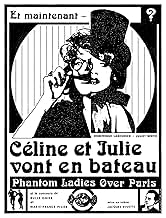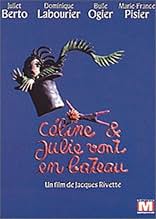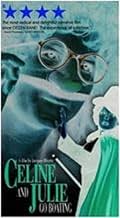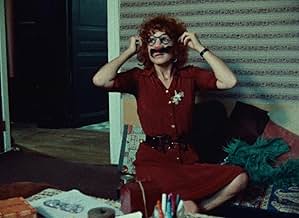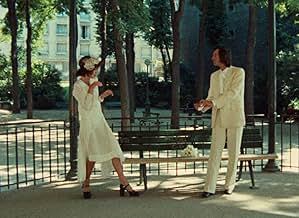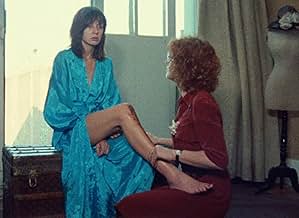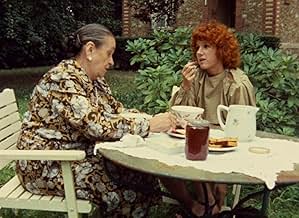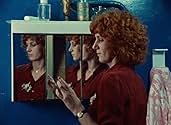Celine and Julie Go Boating
Original title: Céline et Julie vont en bateau : Phantom Ladies Over Paris
IMDb RATING
7.2/10
6.9K
YOUR RATING
A mysteriously linked pair of young women find their daily lives preempted by a strange boudoir melodrama that plays itself out in a hallucinatory parallel reality.A mysteriously linked pair of young women find their daily lives preempted by a strange boudoir melodrama that plays itself out in a hallucinatory parallel reality.A mysteriously linked pair of young women find their daily lives preempted by a strange boudoir melodrama that plays itself out in a hallucinatory parallel reality.
- Awards
- 1 win total
Jean-Claude Biette
- Spectateur au cabaret
- (uncredited)
Jacques Bontemps
- Lecteur à la bibliothèque
- (uncredited)
Michel Caen
- Spectateur au cabaret
- (uncredited)
Featured reviews
Some directors use less than 2% of their footage in the final cut but Rivette must have used 92% of his to make this - perhaps he used absolutely everything, including, apparently, out-takes. Tedium sometimes has a point, but not here. This is annoying-tedium for every scene seems calculated to test our patience. There's no humour or verve or flair or great lines or classic scenes, not even sad attempts at those things, only a forced drollerie that falls flat in every scene There is endless silly giggling, scenes such as those in the nightclub that are just tiresome to watch, fantasy sequences that are presumably meant to look like a corny TV sitcom, but, lacking any scrap of humour, the point is entirely lost and the actors flounder. The girls try far too hard to be cute, and only succeed in being cloying. And I'm waiting for a director to grasp this simple truth: that giving the actors free rein does not make the action more spontaneous and natural, only more strangulated, more self-conscious, more unnatural and cringe-inducing than if they were following a consistent and meticulous script.
After a while you realise Rivette is just playing silly buggers. Fluffed lines are left in, characters glance inadvertently-deliberately at the camera. Rivette will be saying: 'Regard, c'est un film that is pas un film, we're deliberatement toying avec your illusions'. I'm saying: Vous etes un wankeur.
Why three hours? A Senses of Cinema article is eager to explain: 'The tradition of rigid adherence to the 90 minute to 2-hour time frame, enforced by the laws of free market capitalism, is exploded by Rivette. As a filmmaker, Rivette refuses to confine himself to these arbitrary lengths, or to the even more arbitrary, if unspoken, rules about demands on subject matter and mise-en-scène in films of epic length. Instead, Rivette extends the lengths of his films to a point beyond necessity, where it is understood that the film's length in and of itself is a statement about the system he works in and rebels against.' 3 hours simply to defy (capitalistic??) convention? Wankeur.
The audience are the dupes here - poked fun at for trying to apply reality to what is self-consciously only a film. This is not New Wave. I'm gazetting Rivette as a hanger-on, a copyist. He wants to shoot in the style of Rohmer, but he hasn't got Rohmer's indefinable deftness. He wants to break the rules like Godard but he has not got Godard's indefinable style or charisma. He wants to say something meaningful in an offhand way, like Truffaut, but he hasn't got that indefinable intellect for it. All he can do is try. You can feel him trying. It boils down to a single lame joke that isn't funny and a single idea that isn't clever. Three hours of film-flam, tiresome beyond belief.
After a while you realise Rivette is just playing silly buggers. Fluffed lines are left in, characters glance inadvertently-deliberately at the camera. Rivette will be saying: 'Regard, c'est un film that is pas un film, we're deliberatement toying avec your illusions'. I'm saying: Vous etes un wankeur.
Why three hours? A Senses of Cinema article is eager to explain: 'The tradition of rigid adherence to the 90 minute to 2-hour time frame, enforced by the laws of free market capitalism, is exploded by Rivette. As a filmmaker, Rivette refuses to confine himself to these arbitrary lengths, or to the even more arbitrary, if unspoken, rules about demands on subject matter and mise-en-scène in films of epic length. Instead, Rivette extends the lengths of his films to a point beyond necessity, where it is understood that the film's length in and of itself is a statement about the system he works in and rebels against.' 3 hours simply to defy (capitalistic??) convention? Wankeur.
The audience are the dupes here - poked fun at for trying to apply reality to what is self-consciously only a film. This is not New Wave. I'm gazetting Rivette as a hanger-on, a copyist. He wants to shoot in the style of Rohmer, but he hasn't got Rohmer's indefinable deftness. He wants to break the rules like Godard but he has not got Godard's indefinable style or charisma. He wants to say something meaningful in an offhand way, like Truffaut, but he hasn't got that indefinable intellect for it. All he can do is try. You can feel him trying. It boils down to a single lame joke that isn't funny and a single idea that isn't clever. Three hours of film-flam, tiresome beyond belief.
I recommend people read "Excruciating" (federovsky, 8/30/12) and "Much Ado About Nothing" (Milan, 4/15/2012) if they want to know what they are in store for. "Celine and Julie Go Boating" is difficult, frustrating and over long. However, it is also the kind of film that after seeing it, you wonder what other people have to say about it.
I didn't enjoy it much. Visually, it is not terribly special. The relationship between the two women and the "haunted house" is what keeps us watching, but the scenes come very slowly.
Several people have said it unfolds like a dream. Others have pointed out the lesbian/feminist side to it. Another possibility is that the two women represent two personalities of a schizophrenic nurse who committed an unspeakable crime. That would explain the repetitive cutting between one woman as the nurse and then her counterpart switching in. The two sides of the same madwoman angle possibly explains why the story includes the woman who is a performance amateur subbing for the experienced magician.
Between "Celine" (Juliet Berto) and "Julie" (Dominique Labourier), I think Labourier is the strongest here. Labourier has a lot of charisma; too bad Rivette has her often just laughing directly into the camera.
The characters in the "haunted house" are interesting. Marie-France Pisier is a favorite of mine, and she is very mysterious here.
If the scenes didn't unfold so sluggishly, and if the narrative were tighter, I think it would have been great. Unfortunately, it is too much work to recommend.
I didn't enjoy it much. Visually, it is not terribly special. The relationship between the two women and the "haunted house" is what keeps us watching, but the scenes come very slowly.
Several people have said it unfolds like a dream. Others have pointed out the lesbian/feminist side to it. Another possibility is that the two women represent two personalities of a schizophrenic nurse who committed an unspeakable crime. That would explain the repetitive cutting between one woman as the nurse and then her counterpart switching in. The two sides of the same madwoman angle possibly explains why the story includes the woman who is a performance amateur subbing for the experienced magician.
Between "Celine" (Juliet Berto) and "Julie" (Dominique Labourier), I think Labourier is the strongest here. Labourier has a lot of charisma; too bad Rivette has her often just laughing directly into the camera.
The characters in the "haunted house" are interesting. Marie-France Pisier is a favorite of mine, and she is very mysterious here.
If the scenes didn't unfold so sluggishly, and if the narrative were tighter, I think it would have been great. Unfortunately, it is too much work to recommend.
When I first saw this film I was amazed by it. The freshness and the imagination of the two protagonists, the way in which it recognised the magic (real magic) of Paris, and the strange parallel worlds it created in which Celine and Julie are both deeply involved and creating, and then acting, their own parts. On re-viewing it more than ten years later though, I was surprised to be a little disappointed. The magic is so thin. Celine and Julie have taken the, very conscious and explicit, decision not to grow up, and as a result, although they are beautiful adults, their world is a child's world. Their imagination is child-like, in its imagery (sweets, plastic "dinosaur eyes", rather thin puns), in its chosen surroundings (cases full of dolls), its disasters (a grazed knee), its aims (largely disruption of the concerns of surrounding adults), in its ridiculing of sexuality and its steadfast refusal to admit that fantasy is sometimes, necessarily, dangerous. Without any danger or any desperation, it seemed on second visit a charming but slightly futile game.
A PERFECT, SHARED IMAGINATION: something we become entirely incapable of evoking in our adult lives. As children, it's still possible to create an all-engrossing, parallel existence played out in symbiotic harmony by two individuals calling themselves best friends. With an uncluttered and unfettered creativity, these friends are sucked into their inner story to a point that time, place and the mundane habits and duties of one's routine no longer exist, or rather, are incorporated and/or adapted to fit what then becomes one's main existence - the imagined one. What makes this movie so convincingly evoke the yearning for the magic of childhood is exactly this: the fact that this imaginative world is shared so perfectly by two friends, and not just cultivated within an isolation and individuality typical of adult age. No other movie has made me think back at my childhood best friends as vividly as Céline and Julie Go Boating!
Hours spent in a room surrounded by familiar objects turned into so many powerful talismans. Earnest "magic" rituals punctuated by benevolent, mutual derision in the little moments in which one risks getting too serious or devoid of irony. Convulsive giggling fits which end in snorting noises. Relaxed, spontaneous, touchy-feely languid poses making two friends feel like they fit each other's company like a glove. Living the present so perfectly that one is momentarily, blissfully freed of any baggage from the past or the insecurities for the future that stunt one's spontaneity in the present. This isn't just a definition of perfect, child-like friendship, but also of a simple, uncluttered state of pure happiness. Rivette captures the spirit of all these things - childhood and happiness - in a movie unlike any I've seen before. Or rather - the movie may have seemed familiar thematically, but the execution and spirit of it was something else altogether.
As other users have commented here, Céline and Julie Go Boating is inspired by both Alice's Adventures in Wonderland and Henry James, as well as being reminiscent of Buñuel - not just his "surreal" movies but also That Obscure Object of Desire. In the latter, Carole Bouquet and Angela Molina play the same character interchangeably. Céline and Julie do the same when they both, interchangeably play the nurse in the closed-circuit, story-in-the-story involving the man, the blonde woman, the brunette woman and the little girl in the "haunted" house - this story's plot is being played out over and over again in the two protagonists' heads as they strive to both figure its intrigue and the dark heart of its mystery out, all the while deriding the stuffy rhetoric of its melodrama (delightful!). There are clear echoes of Bergman's Persona as well, as Céline and Julie stand in for each other - namely, Céline pretends to be Julie when she meets her childhood sweetheart and cousin Guilou, while Julie stands in for Céline when she attends the magician's audition. Touches of Buñuel and Fellini are also evoked by the dream sequences, with their typical, fragmented rhythm which mixes in dreams, reality, thoughts and imagination. Though innovative and timeless, Céline and Julie Go Boating does also belong to the decade in which it was made, as it has a recognisable 1960s/70s surrealist aesthetic and an interest in "inner landscapes", not for their own sake but for what they say about the psychic goings on of human beings.
Purely thematically, this movie also brought to mind Peter Jackson's 1994 movie Heavenly Creatures. However, though the latter was made exactly 20 years later than Céline and Julie, it is decidedly more "misogynistic" in spirit, to be fair perhaps not consciously or intentionally so. Why am I calling Jackson's movie misogynistic? Because ultimately, unlike Céline and Julie Go Boating, it treats the symbiotic, shared, female imagination that's allowed free rein as something negatively irrational, uncontrollable, dark and finally, destructive, the lesbian undertones becoming morbid rather than light-hearted, humorous and feel-good as in the Rivette's splendid and highly original movie.
What this Céline and Julie Go Boating told me was that in some cases, guiltlessly cultivating, salvaging and exploring one's inner and imaginative life is far more important than meeting the expectations of one's day-to-day, material duties. Therefore, solving the mystery of a "haunted" house is more crucial than, say, furthering one's career (for example, succeeding in an audition for an important, international magician's tour - Céline should have attended it but Julie does so instead, to very amusing and disastrous effect! I loved, loved, loved actress Dominique Labourier's droll histrionics during that scene!).
I have never seen a movie treat with such humour and gaiety a subject as serious, complex and potentially heavy-duty Freudian as exploring one's unresolved childhood issues. Much of this movie is about Julie's (and perhaps everyone's, to a degree) inability to assimilate the past completely (her tarot reading by a fellow librarian reveals this at the beginning of the movie - "Your future is in the past"). To put it stereotypically, the "inner child" needs to be freed before one can truly become an adult - a happy, healthy, sorted, serene, childlike adult. This process of healing is punctuated by the two protagonists by playful role-playing (both Céline and Julie have a ball taking on different identities by also donning different costumes throughout the course of the movie), an endless string of occasions for giggling fits and what is essentially a cheerful use of childish "drugs" (candy and home-made magic potions) to evoke that crucial, life-giving shared imagination. In a sentence, the psychic ailments typical of adulthood are cured with the spirit typical of childhood.
Hours spent in a room surrounded by familiar objects turned into so many powerful talismans. Earnest "magic" rituals punctuated by benevolent, mutual derision in the little moments in which one risks getting too serious or devoid of irony. Convulsive giggling fits which end in snorting noises. Relaxed, spontaneous, touchy-feely languid poses making two friends feel like they fit each other's company like a glove. Living the present so perfectly that one is momentarily, blissfully freed of any baggage from the past or the insecurities for the future that stunt one's spontaneity in the present. This isn't just a definition of perfect, child-like friendship, but also of a simple, uncluttered state of pure happiness. Rivette captures the spirit of all these things - childhood and happiness - in a movie unlike any I've seen before. Or rather - the movie may have seemed familiar thematically, but the execution and spirit of it was something else altogether.
As other users have commented here, Céline and Julie Go Boating is inspired by both Alice's Adventures in Wonderland and Henry James, as well as being reminiscent of Buñuel - not just his "surreal" movies but also That Obscure Object of Desire. In the latter, Carole Bouquet and Angela Molina play the same character interchangeably. Céline and Julie do the same when they both, interchangeably play the nurse in the closed-circuit, story-in-the-story involving the man, the blonde woman, the brunette woman and the little girl in the "haunted" house - this story's plot is being played out over and over again in the two protagonists' heads as they strive to both figure its intrigue and the dark heart of its mystery out, all the while deriding the stuffy rhetoric of its melodrama (delightful!). There are clear echoes of Bergman's Persona as well, as Céline and Julie stand in for each other - namely, Céline pretends to be Julie when she meets her childhood sweetheart and cousin Guilou, while Julie stands in for Céline when she attends the magician's audition. Touches of Buñuel and Fellini are also evoked by the dream sequences, with their typical, fragmented rhythm which mixes in dreams, reality, thoughts and imagination. Though innovative and timeless, Céline and Julie Go Boating does also belong to the decade in which it was made, as it has a recognisable 1960s/70s surrealist aesthetic and an interest in "inner landscapes", not for their own sake but for what they say about the psychic goings on of human beings.
Purely thematically, this movie also brought to mind Peter Jackson's 1994 movie Heavenly Creatures. However, though the latter was made exactly 20 years later than Céline and Julie, it is decidedly more "misogynistic" in spirit, to be fair perhaps not consciously or intentionally so. Why am I calling Jackson's movie misogynistic? Because ultimately, unlike Céline and Julie Go Boating, it treats the symbiotic, shared, female imagination that's allowed free rein as something negatively irrational, uncontrollable, dark and finally, destructive, the lesbian undertones becoming morbid rather than light-hearted, humorous and feel-good as in the Rivette's splendid and highly original movie.
What this Céline and Julie Go Boating told me was that in some cases, guiltlessly cultivating, salvaging and exploring one's inner and imaginative life is far more important than meeting the expectations of one's day-to-day, material duties. Therefore, solving the mystery of a "haunted" house is more crucial than, say, furthering one's career (for example, succeeding in an audition for an important, international magician's tour - Céline should have attended it but Julie does so instead, to very amusing and disastrous effect! I loved, loved, loved actress Dominique Labourier's droll histrionics during that scene!).
I have never seen a movie treat with such humour and gaiety a subject as serious, complex and potentially heavy-duty Freudian as exploring one's unresolved childhood issues. Much of this movie is about Julie's (and perhaps everyone's, to a degree) inability to assimilate the past completely (her tarot reading by a fellow librarian reveals this at the beginning of the movie - "Your future is in the past"). To put it stereotypically, the "inner child" needs to be freed before one can truly become an adult - a happy, healthy, sorted, serene, childlike adult. This process of healing is punctuated by the two protagonists by playful role-playing (both Céline and Julie have a ball taking on different identities by also donning different costumes throughout the course of the movie), an endless string of occasions for giggling fits and what is essentially a cheerful use of childish "drugs" (candy and home-made magic potions) to evoke that crucial, life-giving shared imagination. In a sentence, the psychic ailments typical of adulthood are cured with the spirit typical of childhood.
Praised by the critics as "delicate , mysterious, and exiting", "an original and entertaining metaphor for film-watching and, perhaps, film history", and named "The most radical and delightful narrative film since Citizen Kane! The experience of a lifetime" by New York's critic David Thompson, "Celine and Julie Go Boating" (1974) is all of the above but first of all it is incredible fun to watch. This magic candy of a movie tells the story (or rather plays with the story) of two friends, Julie, a librarian and Celine, a magician. The film starts one sunny summer day in Paris when Julie follows running through the park and losing her stuff all over (a scarf, a shoe
) Celine exactly like another girl in the English country side one sunny summer day had followed a White Rabbit into a world of her imagination. Two girls became friends and soon with the help of a magic memory-inducing candy, they both will be the observers and participants in a bizarre soap-opera like drama that takes place in a mysterious house. It involves two stunningly beautiful women, a blonde and a brunette, who are in love with the same man. The man is a widower with a young daughter who had promised his wife that he would not remarry as long as their daughter is alive. When the blonde and the brunette become desperate enough to try to do something about the situation, it is up to Julie and Celine to come up with the plan and to rescue the young girl. Will they go boating? Well, you will have to stay with them for all 193 minutes to find out. Yes, Rivette takes his time but his movie never seems slow or boring. Playful yet complicated, mad and funny, "Celine and Julie" is a magic movie. It grabbed me from the opening scene - which is of course the opening chapter of "Alice in Wonderland" - and it never let go. Buniel would love this movie, I think. It also reminds me of "Mullholand Dr" and even "Persona" but in the absolutely different mode. Simply DELIGHTFUL.
Did you know
- TriviaIt is a misconception that most of the film was improvised by the actors. Jacques Rivette provided structure but did not let his actors "go wild", instead he let them write. A single scene was improvised, where Celine, played by Julie Berto, brags to her associates about her rich American friend. The rest of the scenes where shot from scripted material, mostly thanks to participating actors. The film is collaboration by several authors, including actors Berto, Labourier, Ogier and Pisier. Rivette's involvement in the writing was to give structure to all the contributions, tightening things up.
- GoofsThe last time Julie receives the cigarette from under the table, it is bigger than it was when her colleague handed it to her.
- ConnectionsFeatured in Berlin Chamissoplatz (1980)
- How long is Celine and Julie Go Boating?Powered by Alexa
Details
Box office
- Gross US & Canada
- $31,452
- Opening weekend US & Canada
- $5,624
- May 6, 2012
- Gross worldwide
- $31,452
- Runtime
- 3h 13m(193 min)
- Sound mix
- Aspect ratio
- 1.37 : 1
Contribute to this page
Suggest an edit or add missing content


